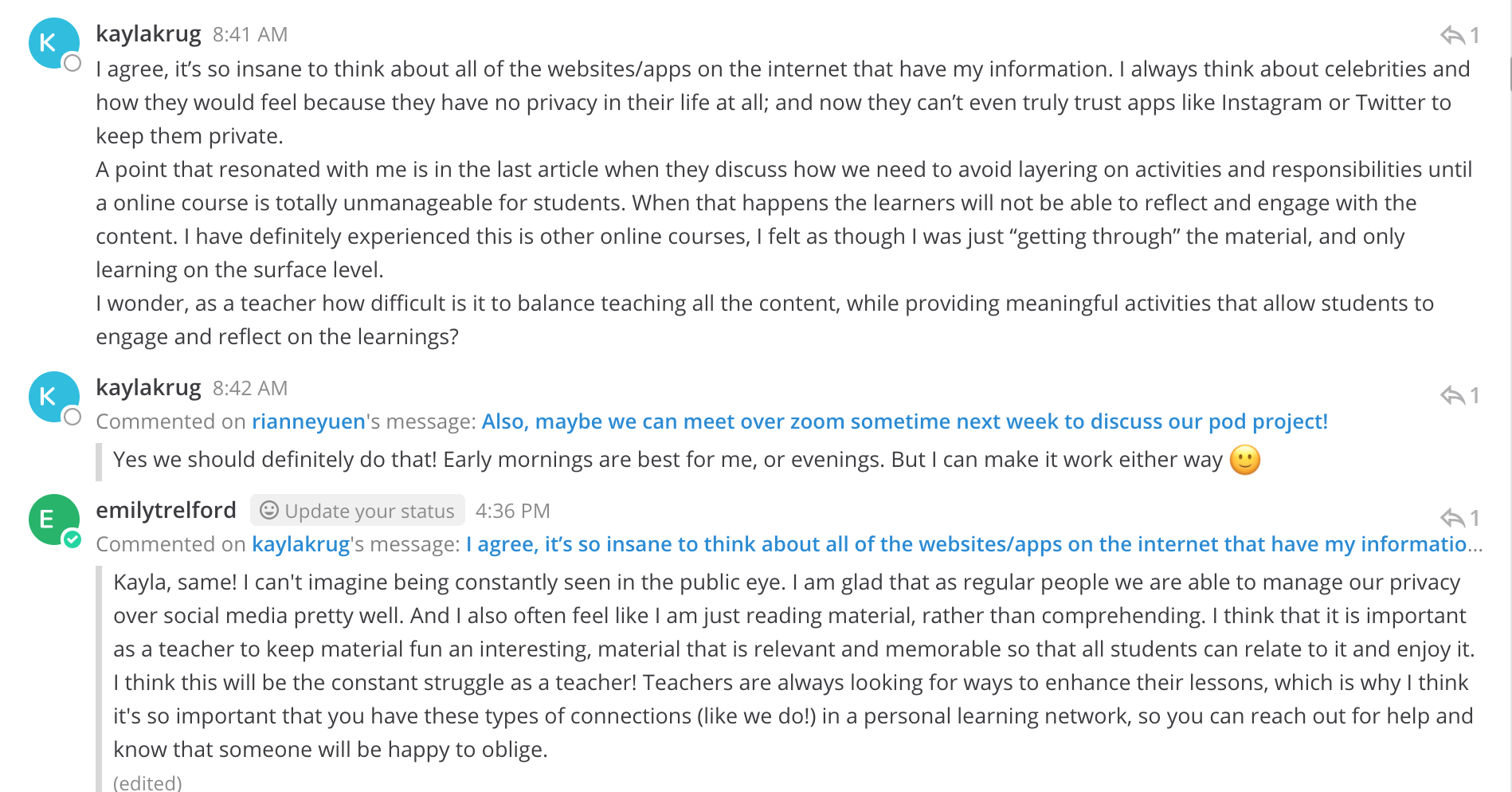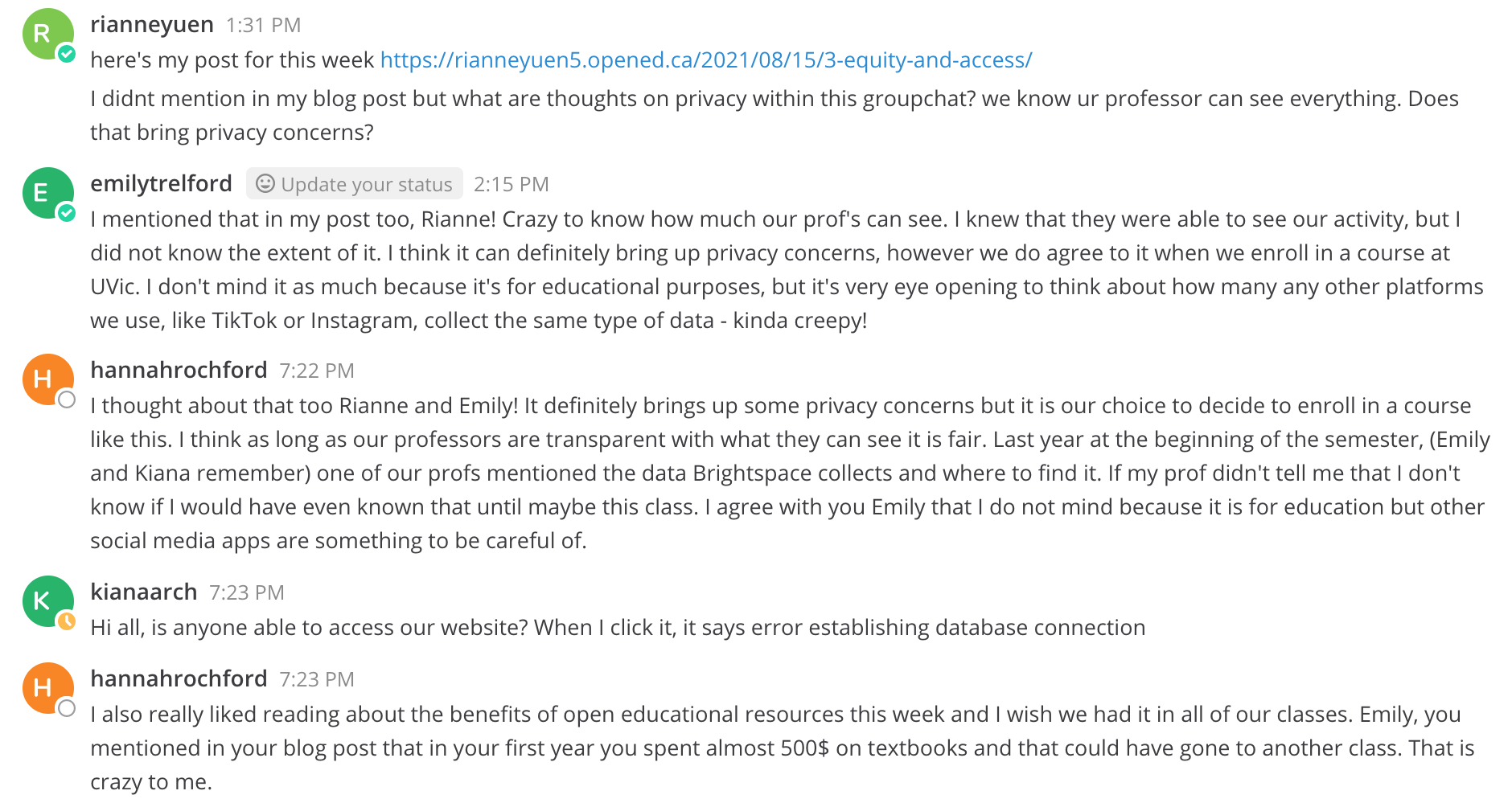Learning Outcome #3 – Critically reflect on and articulate concepts around modality, pedagogy, and access, including distributed and open learning theory, online and open learning history, privacy laws, online learning communities, open research, and open data.
I feel as though learning outcome #3 was evident throughout my studies in this term. In my discussion #1 post:
I mentioned a lot about privacy. What stood out to me when doing the readings for this week, was how willing and able I was to give out my personal information to whatever platform asked for it. Prior to entering the education program, I would give out my name, address, credit card number, you name it – to whatever account I was creating (Instagram, Twitter, YouTube, anything). Regan and Jesse’s (2019) article gave me insight into how I now, after taking my ed-tech classes, have this whole separate “private” side to me. I keep my accounts on lock down, and only allow people I choose to see my content. I’m not an avid, every-day poster, but I do want to keep my private life just that – private. When I realized that my future employer could see anything that I have online, I cleaned up my digital identity and secured my accounts. I don’t have anything bad online, I just don’t want to be in the spotlight!
With online learning communities, I am so grateful to be a part of the ones I am in. We are able to connect with one another, and share our thoughts an learnings in a way that is interactive and meaningful, not just for grades. Vaughan & Garrison (2013) mentions how open learning enables educators to more access and opportunities for students to interact. I like the way that many of my classes have partaken in this learning community style, via WordPress blogs, Mattermost, or even just the discussion forum on Brightspace. It’s super beneficial to my learning when I am able to see a topic from a colleagues point of view. They might have something useful that I would have never thought of!
Below is a screenshot from the Mattermost channel, where we discussed a bit about privacy, as well as learning communities:

Finally, in my discussion post on topic #3, I mentioned what Ryan had put out on the EDCI 339 home page blog about the privacy with Brightspace. I had recalled a professor mentioning this in one of my classes last fall, but I never really knew the extent of what the professors could see. It was pretty shocking to learn that they are able to see all the times we log in, how many posts we interact with, or how long we spend on a topic. As I mention in the screenshot below, I felt somewhat at ease knowing that this privacy invasion is for educational purposes. We willingly enroll in a course at UVic, and so our data is collected. What concerned me more was the amount of data that gets collected on other platforms, like TikTok or Instagram. We have to be really cautious with which platforms we want collecting our private information and data!

Overall, this learning outcome was super eye-opening to me. I learned so much about privacy and what others can or should see. I am also grateful to have learned a lot more about online learning communities! Through our Mattermost chat and pod meetings, I really felt comfortable enough to ask questions, and ponder certain topics. My colleagues really helped me through the course, so thank you!
I think that everything I did in this course could have been reflected somewhere in this post, but I chose to just highlight some of the items I thought were most relevant. Moving forward, I think it is important to be aware of our privacy settings, as well as all the platforms that will collect our data. For me, if something is for educational purposes, I am open to data collection and keeping my accounts relatively open. Although I will be more cautious in the future with what information I consent to a website using, as well as what I choose to be shown to the public.
Resources:
Regan, P., & Jesse, J. (2019). Ethical challenges of edtech, big data and personalized learning: Twenty-first century student sorting and tracking. Ethics and Information Technology, 21(3), 167-179. DOI: 10.1007/s10676-018-9492-2
Vaughan, N. D., Garrison, D. R., & Cleveland-Innes, M. (2013). Teaching in blended learning environments: Creating and sustaining communities of inquiry. AU Press.
